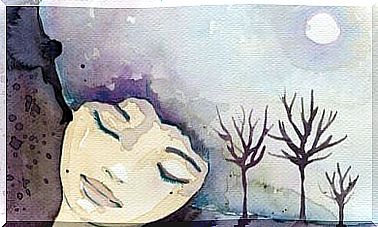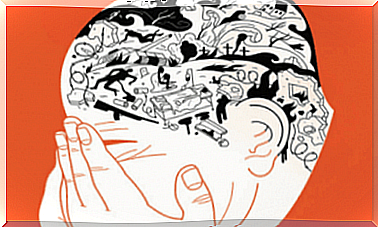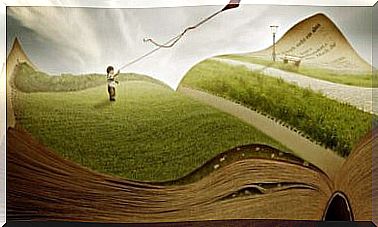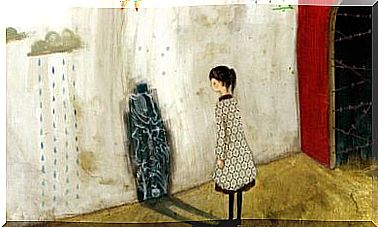The Myth Of Plato’s Cave: The Duality Of Our Reality
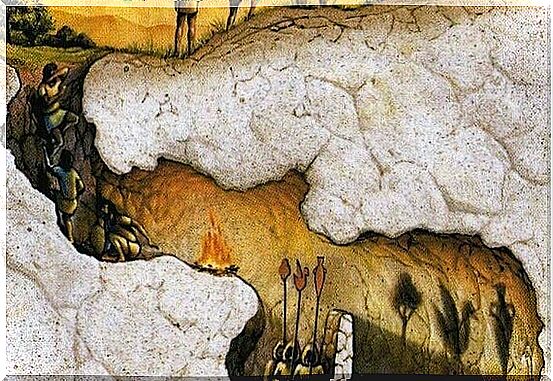
Plato’s cave myth allowed us to understand how this philosopher perceived the world. A relationship between the physical element and the world of ideas that gives rise to a reality full of lights and shadows. On the one hand, we find reality as it is. On the other hand, we deal with a simulation of the same where our beliefs and our illusions are the main protagonists. However, before we dive into all of this, what is the myth of the cave about?
In the myth we are presented with some men who since birth are chained in the depths of a cave of which they can only see one wall. They have never been able to get out of there and they have never even been able to look back and know the origin of the chains that bind them. However, behind them there is a wall and a little further away a bonfire. Between the wall and the bonfire, there are men carrying objects. Thanks to the fire, the shadows of the objects are cast on the wall and the chained men can see them.
A fictitious reality
Men had only ever seen this since their birth, so they had no other needs nor the curiosity to turn around and see what those shadows reflected. However, it was a deceptive, artificial reality. Those shadows distracted them from the truth. Despite this, one of them had the courage to turn around and see beyond.
At first he felt confused and annoyed by everything, especially the light he saw at the bottom (the bonfire). Then, he began to suspect. He had believed that shadows were the only thing in the world, but was that so? As he advanced, his doubts tempted him to return to his shadows.
However, with patience and effort he continued. Gradually getting used to what was now unknown to him. Without letting himself be overcome by confusion or surrendering himself to the whims of fear, he left the cave. When he ran back to tell his companions everything, however, they welcomed him and made fun of him. A contempt that reflected the disbelief such cave dwellers felt at what the adventurer told them.
It is curious to reflect on the fact that this vision offered to us by the myth of the cave can be applied to current events. This model that we all follow and in the name of which, if we go outside the box, they begin to judge and criticize us. We must think that we have made many of our absolute truths our own without stopping to question them, without asking ourselves if the world is far or near from being as we paint it.
For example, thinking that error is synonymous with failure can lead us to abandon any project at the first setback. However, if we do not get carried away by this idea, we will cultivate our curiosity and the error will stop being a devil totally charged with negativity. A different perspective will allow us not to fear the error, moreover when we commit it, we will be predisposed to learn from it.
Getting out of the cave is a difficult process
The man who in the myth of the cave decides to free himself from the chains that keep him prisoner takes a very difficult decision which, far from being accepted by his companions, is considered by them as an act of rebellion. An attitude not well seen, which could have made him give up his intent. When he makes up his mind, he takes the solitary path, overcomes the wall, advancing towards that bonfire that causes him so much distrust and that dazzles him. Doubts devastate him, as he does not know what is real and what is not.
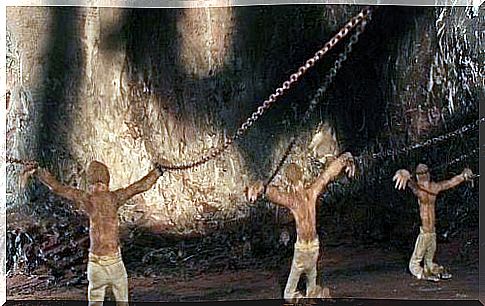
He has to get rid of the beliefs he has been carrying with him for a long time. Ideas that are not only rooted in him, but which also form the basis of the rest of his belief tree. However, as he progresses towards the cave exit, he realizes that what he believed was not entirely true. Now… what can he do? Convince others who mock him about the freedom they can aspire to if they decide to put an end to the apparent comfort in which they live.
The myth of the cave presents ignorance to us as that reality that becomes uncomfortable when we begin to be aware of its presence. Faced with the lesser possibility that there is another possible worldview, history tells us that our inertia pushes us to overthrow it as we consider it a threat to the established order.
Perhaps due to our condition as humans we can not do without this world of shadows, but we can certainly make an effort to make them ever sharper. Perhaps the perfect and iconic world of ideas is a utopia for our nature, however, it does not mean that giving up our curiosity is better than surrendering to the convenience of staying still in what we know today (or what we think we know).
